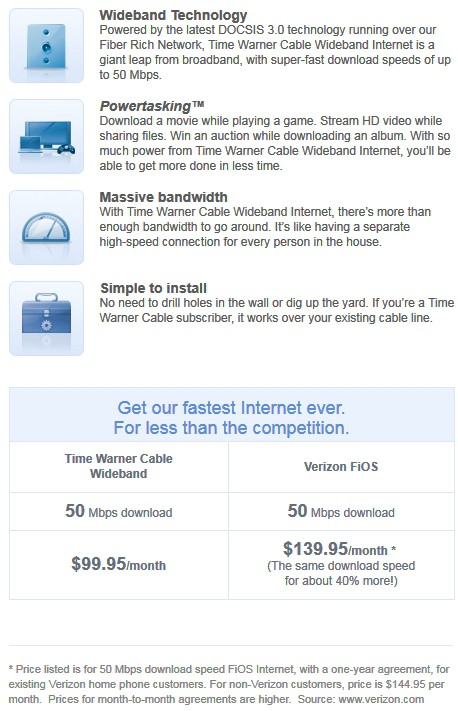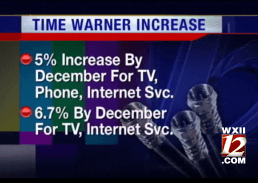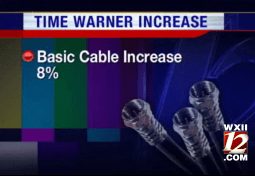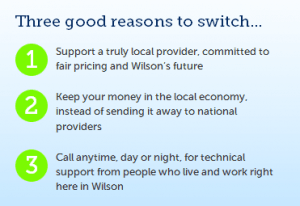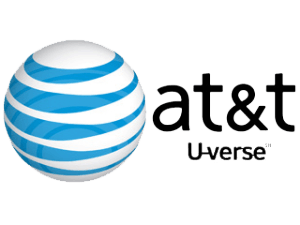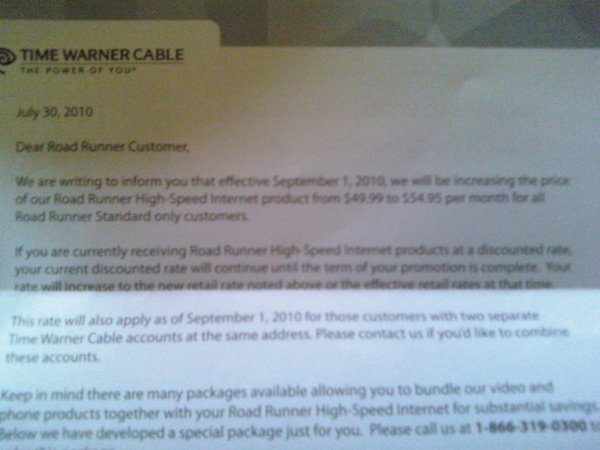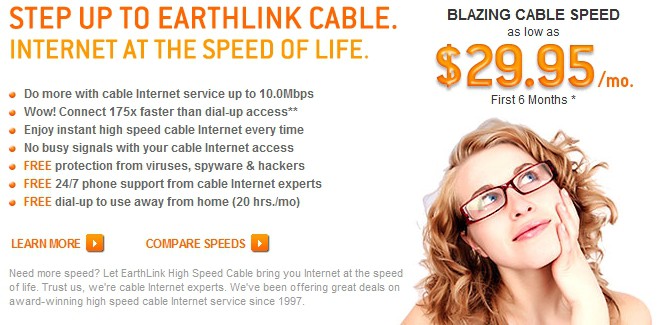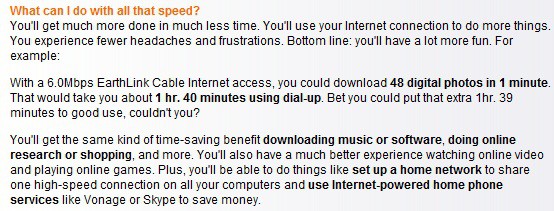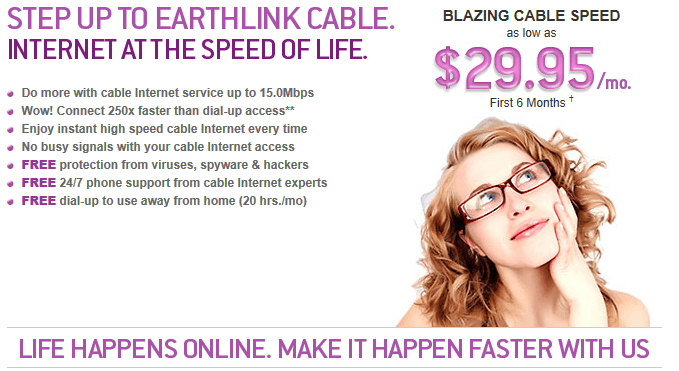 These kinds of testimonials help fuel our fight on behalf of consumers for better (and cheaper) broadband:
These kinds of testimonials help fuel our fight on behalf of consumers for better (and cheaper) broadband:
Hi Guys,
I don’t usually take the time to write thank you’s, but I found your site the other day and managed to save over $20 on my cable bill by switching to ”Earthlink” which I had no idea was possible. When I signed up with Bright House I was promised the $45 a month price for standard Internet, but I signed up a day before their prices jumped to $50. I managed to fight to get my price down for $45, but all of a sudden that stopped and they were refusing to give me the price I signed up for, for the remainder of the year. Due to that, I switched to the Earthlink promo prices and got Bright House to switch me over. They tried to lie to me on the phone to make me think I couldn’t get the Earthlink promo pricing, but I won the argument and am now very happy.
In six months, I’ll try to switch back to Road Runner and get their promo prices.
This is such a hidden unknown gem and has saved my family lots of money. Thank you!
— Scott
Thanks Scott. Time Warner Cable and Bright House Networks have Earthlink as a hidden little secret most customers know nothing about. It’s an arrangement that started way back in 2001 with the now-long-forgotten (and broken up) merger between AOL and Time Warner. A voluntary agreement to allow third party ISPs to sell broadband service over Time Warner Cable has been ongoing ever since, even though customers would routinely find Earthlink’s regular prices not so exciting, if they found them at all.
 The Earthlink savings are best realized for broadband-only customers who do not want to get tied down with a double or triple-play package from their cable company. Both Time Warner Cable and Bright House charge considerably higher prices for standalone broadband service. It’s part of a marketing tactic to convince you better savings are possible with a bundled service package. But if you don’t care about the phone line or cable TV, why pay for either?
The Earthlink savings are best realized for broadband-only customers who do not want to get tied down with a double or triple-play package from their cable company. Both Time Warner Cable and Bright House charge considerably higher prices for standalone broadband service. It’s part of a marketing tactic to convince you better savings are possible with a bundled service package. But if you don’t care about the phone line or cable TV, why pay for either?
For every third-party ISP we’ve encountered reselling service on Time Warner Cable or Bright House, it seems mostly an exercise in branding. For example, Earthlink’s standard and “turbo” products are totally identical to Road Runner offered by both cable companies, with two important distinctions:
- You do not get the benefit of SpeedBoost, a temporary speed increase during the first few seconds of a file transfer;
- You are assigned an Earthlink e-mail address, not one from Bright House or Time Warner Cable.
In fact, Earthlink as a company seems to be running mostly on auto-pilot these days. We found their website woefully outdated, still selling speeds upgraded several years ago. If Bright House locally sells 10/1Mbps standard Road Runner service and Earthlink offers 7Mbps with a 384kbps upload speed, you will actually get 10/1Mbps from Earthlink as well. The only difference is the name of the service as it appears on your monthly Time Warner Cable or Bright House bill. Both cable companies literally just select Earthlink from a drop-down menu on the customer service computer screen. All service calls and billing are handled by the cable companies. If you need technical support, however, it will come from an overseas call center or online “chat” platform Earthlink runs. But Earthlink includes something Time Warner Cable and Bright House customers lost several years ago — up to 20 hours a month of free dial-up usage when away from home.
After the Six Month Promotion….
 Earthlink charges $29.99 a month for speeds that are identical to Time Warner Cable or Bright House’s Road Runner Standard service. In most areas this is or will soon be 10/1Mbps. Turbo, which usually increases speeds to 15/1Mbps, costs another $10 a month. These promotional prices are good for six months.
Earthlink charges $29.99 a month for speeds that are identical to Time Warner Cable or Bright House’s Road Runner Standard service. In most areas this is or will soon be 10/1Mbps. Turbo, which usually increases speeds to 15/1Mbps, costs another $10 a month. These promotional prices are good for six months.
When the six months are up, you are then qualified to participate in whatever New Customer Promotions Time Warner and Bright House are running for their broadband service. We are commonly seeing offers of $29.99 a month for a year of standard Road Runner service in upstate New York, with occasional offers of a year of free Road Runner Turbo service thrown in. Assuming those prices remain in effect, you should be able to secure at least 1.5 years of broadband service for $30 a month. Remember, if your cable company charges you a modem rental fee, consider investing in your own to save that additional charge. They are priced well under $100.
When your six months of Earthlink and a year of Time Warner/Bright House promotional pricing is up, simply threaten to take your business elsewhere, and you will usually find them willing to extend the promotion for an additional year. If not, schedule a cancellation date two weeks out and wait for an inevitable phone call from the customer retentions department with a special “winback” offer.
 Also remember you can always start new service under the name of a spouse or family member. Third party resellers (Google “Time Warner Cable “and pay attention to the online ads) may even throw in a prepaid rebate card for signing up for service through them, so shop around when the promotions expire.
Also remember you can always start new service under the name of a spouse or family member. Third party resellers (Google “Time Warner Cable “and pay attention to the online ads) may even throw in a prepaid rebate card for signing up for service through them, so shop around when the promotions expire.
These shopping tips may apply to other cable broadband providers as well. Remember, if your local phone company is now providing more than traditional DSL, most cable companies will go out of their way to hang on to a customer threatening to walk to AT&T U-verse or Verizon FiOS. Let them fight to keep you as a customer, and you keep the savings.


 Subscribe
Subscribe
